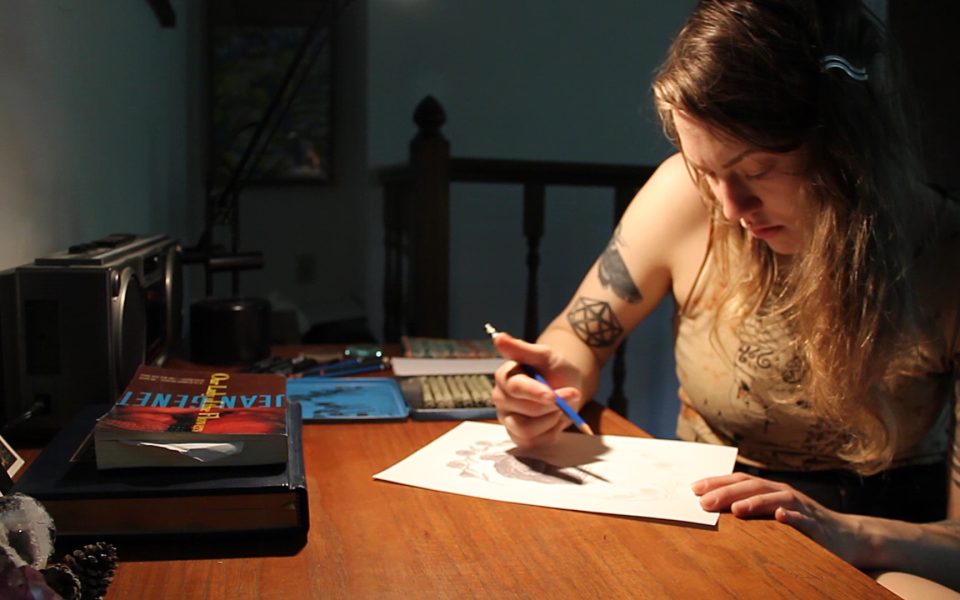by Sayaka Matsuoka
Being queer in the South is not easy.
Slow Holler, a collaborative art project, aims to carve out a place for queer and Southern artists to come together. The initiative, launched in Greensboro by E Henderson, gathers artists from around the country who identify as queer or as having Southern ties or both to craft a modern deck of tarot cards. Henderson thought of the idea a couple of years ago when they (some queer people prefer the pronoun “they” to “she” or “he”) were at a friend’s house and saw people doing tarot readings for each other.
To Henderson, the tarot cards are spiritual and personal but can also be used to bring people together. They envisioned the cards as a way to lift up queer voices. The project is part of a larger framework within Slow Holler, and if is successful, it will be followed by other ventures.
Tarot cards originated in 15th Century Europe as playing cards, but are now commonly used for divinatory purposes. The Slow Holler project hopes to elevate the cards to an art form and create a platform through which queer and Southern creators can tell stories. The project currently has 29 artists working together to form a standard 78-card deck, with each artist designing one to five cards. On March 28, the creators, contributors and supporters gathered in Durham to celebrate the launch of Slow Holler’s Kickstarter, which will help fund the project.
“We need 1,100 decks to be claimed for the project to be funded,” Henderson said.
Each deck costs $52 and the overall goal of the Kickstarter is $55,000, most of which will be used for printing and a small portion to pay the artists. So far, they have raised more than $10,000.
Though ambitious, other similar projects have been successful including the Collective Tarot, based out of Portland, Ore. But Henderson said Slow Holler and the Collective Tarot have key differences. For one, the art styles of the cards in Slow Holler vary, giving designers free rein to use their aesthetic as long as they stay within an overall color scheme of red and black.
“All of our illustrations are handmade whether it be in ink, linocut, graphite drawings, or painted,” Henderson added.
This gives the deck a very eclectic vibe.
Artists from all over the country are contributing to the project, but many have roots in the Triad, including Ellis Driver, who grew up in a farming family in Greensboro and attended the Early College at Guilford.
Although Driver doesn’t consider herself a professional artist, she has a studio, does commission work and illustrates frequently. She formed a relationship with tarot cards as a child and fell in love with the designs. Her card “The Chariot” modernizes the subject by replacing the traditional horse-drawn car with a bright red pickup truck under a sea of stars, creating an idealized snapshot of the South.
Driver, who identifies as queer, feels it is important to show that queer culture exists in the South.
“I think there is a niche for this deck here,” she said. “People will relate to it. You can look at the cards and see yourself.”
She hopes this modern interpretation of the cards will cast the South in a more positive light. Other Slow Holler artists, like Greensboro native Hilary Flint, agree that a modernization of the cards is necessary.
“I think this deck is going to tell a divergent, much more profound story than a traditional tarot deck,” Flint said. “Traditional decks can feel a little archaic and be somewhat hard to relate to, especially for a queer audience.”
Flint, who now lives in Providence, RI, works with black ink and relief printing to craft graphic works, and draws influence from geometric patterns. Their card, titled “Fortuna,” exhibits those qualities through converging thin lines that shade clouds bordering a snake eating its own tail.
Born and raised in Greensboro, Flint says their experience growing up here allowed them to be a part of a rare and inspiring community. Participating artists Ayden Love and Xander Stewart feel the same way.
“There is a strong, tight-knit queer community in Greensboro,” Love said. “Everyone has each other’s back.”
Love’s card “The World,” also employs the circular snake with its tail in its mouth but set on top of a black background.
Love and Stewart grew up in Greensboro and High Point respectively, and see tarot cards as a way for people to better understand themselves and tell their stories.
“In the South, queer people are often silenced,” Love said. “But these stories need to be heard and those telling them need to know they are worthwhile.”
Stewart picked up the thought: “The South has so many stories fueled with a historical hatred of otherness, but to have a deck that embraces otherness… is so important.”
While the various cards with intricate designs, colors and imagery are stunning, the real triumph of Slow Holler lies in the diverse group of individuals who are working together to do something different.
Henderson imagined this first phase of Slow Holler as a large collaborative work with the cards connecting individuals through its strong and visual storytelling quality.
“The cards are like blank canvases and are meant to be interactive,” Henderson said, “They’re meant to be shared.”
Join the First Amendment Society, a membership that goes directly to funding TCB‘s newsroom.
We believe that reporting can save the world.
The TCB First Amendment Society recognizes the vital role of a free, unfettered press with a bundling of local experiences designed to build community, and unique engagements with our newsroom that will help you understand, and shape, local journalism’s critical role in uplifting the people in our cities.
All revenue goes directly into the newsroom as reporters’ salaries and freelance commissions.


Leave a Reply